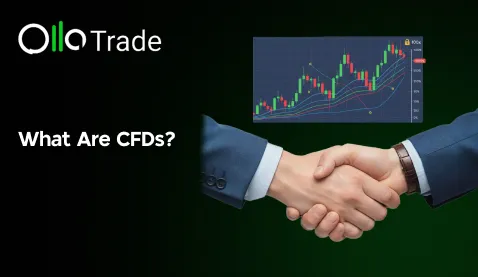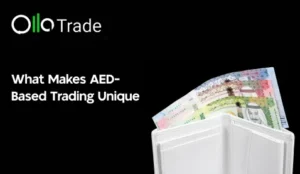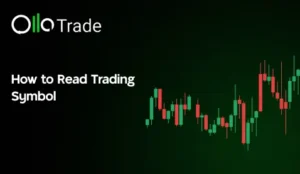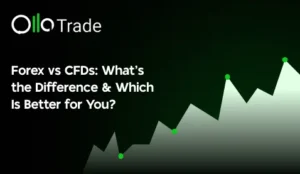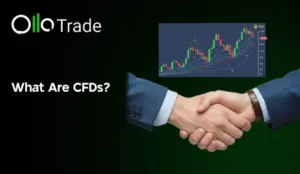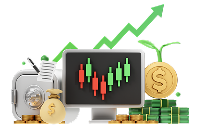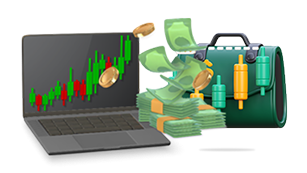CFDs is short word for “Contracts for Difference”. It might sound technical but actually they’re a modern and flexible way to trade without owning the actual asset. It’s like watching the value of gold or a stock and making a move based on where you think it’s headed without buying the gold or stock itself.
This makes CFDs super popular among people who want to jump into the market fast and with more freedom. Whether it’s stocks, currencies, or commodities, you’re simply trading on price movements. Intrigued? Let’s break down exactly what CFDs are and why they’re gaining traction.
What Are CFDs? Breaking Down the Basics for New Traders
A Contract of Difference (CFD) is a financial transaction where you and the broker trade the difference between the price of a contract’s opening and closing date of an asset. This means you can speculate on whether the price of stocks, currencies, or commodities will go up or down without actually owning the asset itself.
Think of it like riding the waves in the market: you don’t own the ocean, but you can still catch the waves and profit from their movement. CFDs give a flexible way to get involved with different markets without the usual headaches of ownership for new traders. However, keep in mind this can be a double-edged sword while profits can come quickly, losses can too, so it’s always smart to look before you leap.
CFD Trading Explained Without the Jargon
CFD trading is like: you’re playing the classic “buy low, sell high” game, but with a twist. If you think prices will drop, you can also “sell high, buy low” to make a profit. Here’s how it works in practice:
- You choose the number of contracts to trade, and you only have to put up a portion of the total value. This is called the margin.
- Thanks to leverage, your buying power is amplified, meaning with a small deposit you control a bigger position. However, keep in mind that leverage is a two-edged sword: while it might raise earnings, it can also magnify losses.
- Another cost to keep in mind is the spread, which is the difference between the buying and selling price set by your broker, like a small hurdle your trade needs to clear before you profit. For example: if you buy a CFD on a stock at $100 and the price rises to $110, you’d earn a $10 profit for each contract, minus any fees or spread.
- The great part is that CFD trading gives you access to global markets and the flexibility to trade in both rising and falling markets.
On the flip side, the risks of leverage and market volatility mean you need to be cautious and have a solid risk management plan. It’s as much about knowing when to “look before you leap” as it is chasing profits.
A Beginner CFD Guide to Getting Started Safely
So, you’re curious about CFD trading! Before you click that “trade” button, let’s cut to the chase and walk through the most practical steps for newcomers.
Try a Demo Account
You shouldn’t dive into CFD trading without some practice. Most brokers offer demo accounts, giving you pretend money to fool around with. No risks, no sweat; just learning the platform, testing your strategies, and getting a feel for the market’s twists and turns. Treat this as your playground to make mistakes, so you don’t have to pay for them later.
Practice Small
Once you step into live trading, avoid the classic rookie mistake of throwing in more money than you can handle. Start with small amounts. This way, you can navigate real market waters without getting caught in a riptide. If things don’t go as planned, you’ll be able to limit your losses and maintain your confidence.
Get Comfortable with the Platform Tools
CFD platforms come with a bunch of bells and whistles like:
- Charts
- Indicators
- Stop-Loss Tools
Spend time to explore these features in your demo account, so you know exactly where everything is when real money’s on the line. It’s a bit like knowing your way around a kitchen before cooking a fancy meal.
Don’t Skip Homework
In the world of CFDs, knowledge is power. Study the assets you want to trade, understand what moves their prices, read up on trading strategies, and always keep an eye on current financial news. A well-researched decision is a sturdier bridge than a blind leap. The chances to be caught off guard when you the more knowledge than basics.
Keep Emotions in Check
Success in CFD trading isn’t just about logic; it’s also a battle with your own emotions. Excitement and frustration might impair your judgment, resulting in rash decisions and “oops” moments. Set up a plan, use stop-loss orders, and take regular breaks. Remember, the more you know, the less likely you will be taken off guard.
The Pros and Cons of Contract for Difference Trading
Contract for Difference (CFD) trading is a double-edged sword that offers both exciting opportunities and notable risks.
- On the upside, it requires a relatively low capital outlay thanks to leverage, making it easier for traders to get their foot in the door without breaking the bank.
- Plus, they provide the flexibility to profit whether markets are on the rise or taking a dip.
- You can “go long” or “short” with ease, which is a blessing for those who like to ride the waves of both bullish and bearish trends.
However, this very leverage that amplifies gains is also a blessing and a curse: it can magnify losses just as quickly, potentially leading to losses beyond your initial investment if you’re not careful. So, while CFDs can open doors to diverse trading experiences without owning the underlying asset, they demand respect and solid risk management.
Conclusion
CFDs can be an exciting way to step into the trading world without the hassle of owning assets. They give you flexibility, fast access to global markets, and the chance to profit whether prices rise or fall. But this isn’t a get-rich-quick game. With smart planning, solid research, and a little patience, CFDs can be a powerful tool in your trading toolkit.
Explore CFD trading in a smart way with Olla Trade Ltd tools, support, and real-time access.

